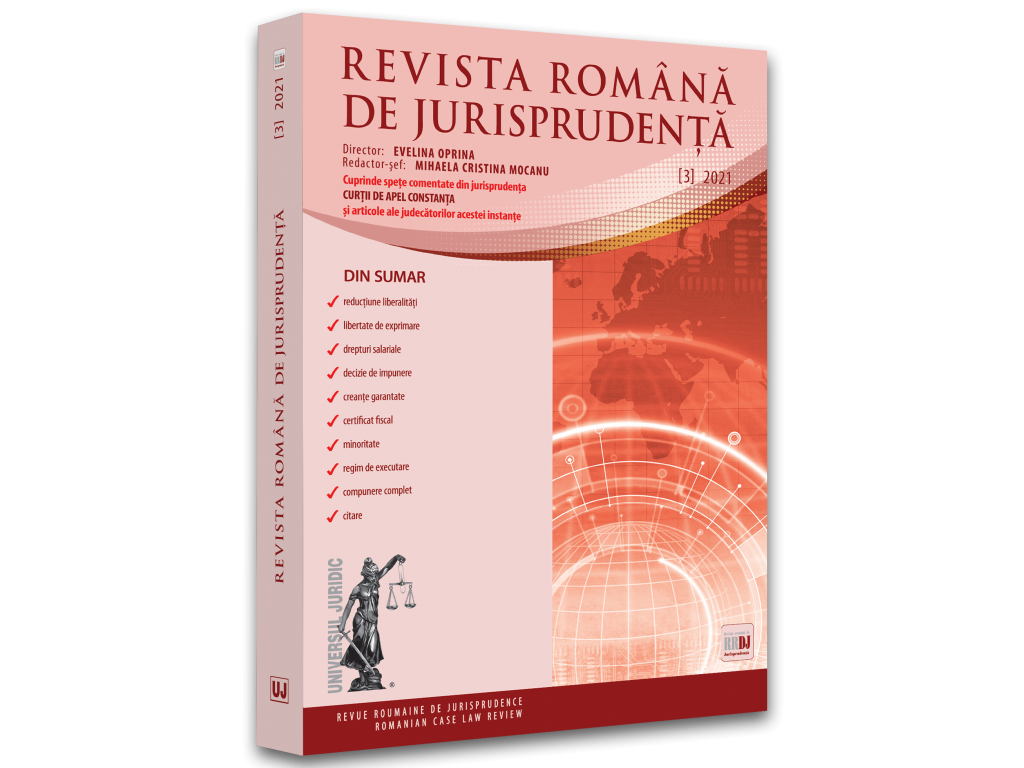Trial costs incurred in criminal proceedings. Requesting them in civil proceedings
DREPT CIVIL ŞI DREPT PROCESUAL CIVIL
Abstract
The present dispute concerns the existence of a case of financial liability of the State for costs incurred in criminal proceedings brought against the plaintiffs, which did not result in a finding of criminal guilt, but in a dismissal.
Any manifestation of the state authorities that falls within the scope of the powers, competences and regulated working procedures is a legal one, regardless of whether or not at the end of it a liability of the person subject to that procedure is established (contraventional, administrative, criminal); exceeding the limits set by the law - imposed in terms of powers, competences, time of action, specific methods of approach, etc. - may, however, take that manifestation out of the scope of legal acts, requiring the dysfunction to be regulated by other mechanisms, also provided for by the legislator. With regard to the activity of judicial bodies, the State's pecuniary liability is limited, by the will of the legislator, to the hypotheses of judicial error, the State's liability being established „in accordance with the law”, „...for damage caused by judicial errors”. This choice of law is appropriate to the role of the public function of the judicial service as a whole, which allows the person claiming to be injured in a right of his or her own to request the authorities to initiate specific procedures to assess the legitimacy of the right asserted and to require others to behave accordingly.
It follows from the correlation between the features of the criminal proceedings and the purpose of the criminal proceedings as a whole that the decision of dismissal ordered in the light of the provisions of Article 16 para. (1) (a) of the Criminal Procedure Code cannot be regarded as a failure of the judicial authorities in the conduct of the criminal proceedings or as an uncontested result of informal/unlawful procedures. Such a view ignores the fact that the principle of the presumption of innocence and the principle of the separation of judicial functions (specific to the criminal process) operate alongside the principle of legality both at the stage of investigating the crime and gathering evidence, and at the pre-trial chamber and subsequent trial stage.
If, following the production of the evidence and the verification of its legality, the subject of the criminal proceedings obtains a dismissal on the grounds that there is no criminal offence, the „triumph” belongs to the presumption of innocence and the principle of legality. The failure of the state, through its judicial authorities, occurs only when legal procedures and fundamental principles have been violated in the conduct of the trial (civil or criminal) and this has been explicitly established under the law.
Criminal procedure law does not require parties to recover in full and in all cases their legal costs in criminal proceedings, which is in line with the view in ECHR case law that a person's access to a court may be subject to limitations, including of a financial nature, without this aspect - enshrined in national law - constituting an obstacle in itself to access to justice.
The theory of ab initio procedural guilt of the judicial authority of having initiated criminal proceedings ex officio and before having clearly defined the scope of the evidence, on the basis of mere indications of the commission of a criminal act, vitiates the very guarantee of the administration of justice and undermines the independence of the judicial authority - which can only act by virtue of the supremacy of the law, and not under fear of recourse action by the person who claims to have been injured by the proceedings initiated.








